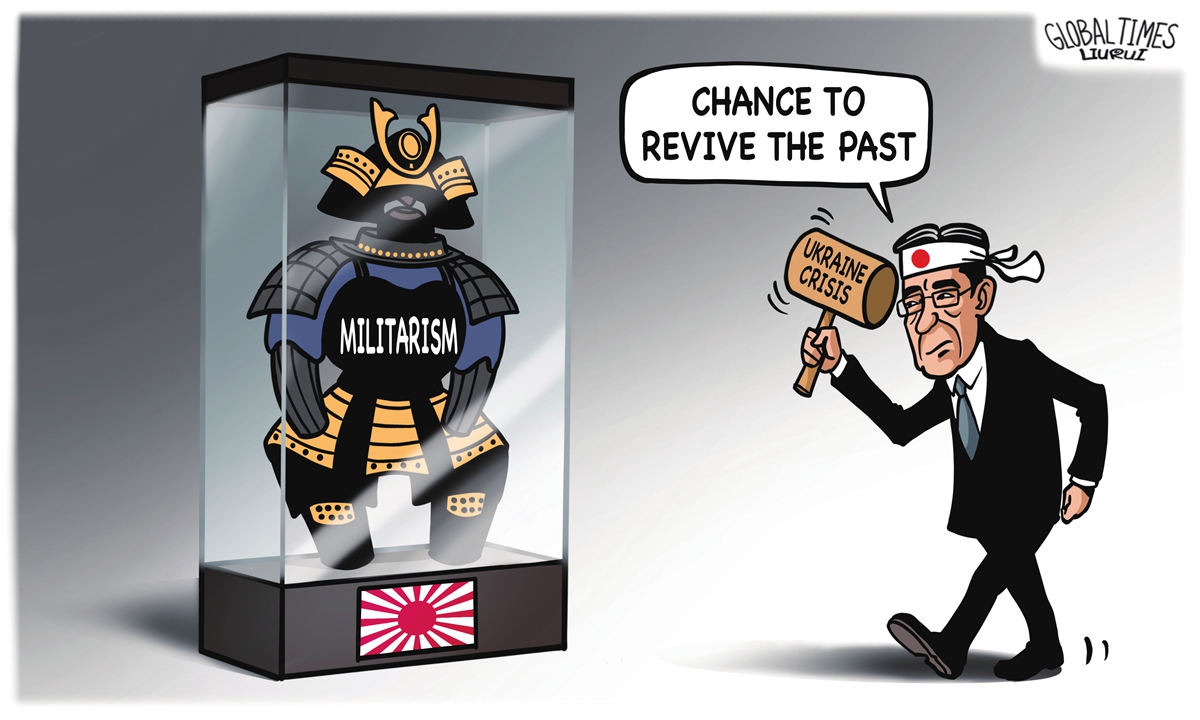
An excuse to militarize Illustration: Liu Rui/GT
At the end of April, Japan's ruling Liberal Democratic Party proposed doubling the country's defense budget to a record-breaking $106 billion, up to 2 percent of Japan's annual GDP, citing the Russia-Ukraine conflict as a cause for concern while referring to NATO members' military spending standards. Japanese Defense Minister Nobuo Kishi explained that the surge in defense spending is to give Japan "counterstrike capabilities" in the region.
During the NATO Summit in late June, Japanese prime minister Fumio Kishida called on the organization to shift its focus to Asia. It shows that Japan wants to strengthen its weak point in military through more frequent interaction with NATO and thus realize its "great-power ambition". In fact, right-wing politicians have long been attempting to change the country's pacifist constitution. They advocate increasing military spending and developing offensive weapons in order to shake off label on Japan as a defeated nation in World War II and thus realize the country's "normalization" on military forces. With such a scheme in mind, Japan has gone so far as to invite the world's largest military alliance, NATO, into the Asia-Pacific region, which has resulted in more tensions in the area.
Article 9 of Japan's post-war constitution stipulates that Japan renounces war as a sovereign right of the nation and the threat or use of force as means of settling international disputes; Land, sea, and air forces, as well as other war potential, will never be maintained; The right of belligerency of the state will not be recognized.
The main purpose is to prevent the revival of its expansionist ambitions. Article 9 together with the 1 percent GDP defense budget cap, and the "Three Non-Nuclear Principles" have combined to help ease the concerns of Asian countries once invaded by Japan. However, in recent years, Japan has been taking small but swift steps forward to break through its military restrictions, such as taking advantage of various opportunities to revise laws. What is even more alarming, amending Article 9, which is at the core of the pacifist constitution, has become a goal of the ruling party.
Since the outbreak of the Russia-Ukraine conflict, Japan has been sensationalizing Ukraine's suffering, with the aim of gaining public support for its military buildup. However, surveys show nearly half of the Japanese population opposes any amendment of Article 9. The Japanese public is clearly against militarist expansion or getting involved in US-led wars.
The Japanese government's scheme is to free itself from the shackles of the past and normalize its military power gradually and unnoticeably, so that the world does not take any steps to thwart its plan until it's too late. With the United States turning a blind eye, Japan's militarization has gone further and further and has far exceeded its defense needs in many aspects. Some Japanese media pointed out that it is unreasonable for Japan, a country with no obligation to defend others, to align its defense budget with NATO members.
Japan often uses North Korea, China and Russia as an excuse to promote its militarization, saying that it opposes "changing the status quo by force". However, it is Japan that unilaterally "nationalized" the disputed Diaoyu islands and is increasingly interfering in the Taiwan question and South China Sea issue. Japan is the one who is changing the security conditions in Asia and exacerbating conflict. In addition, the so-called "rules-based international order" that Japanese leaders often brag about is actually a "hegemonic order" dominated by a certain country and disguised as the "international order".
To many Asian countries, the history of brutal invasion and occupation at the hands of Japanese military is a memory they will never forget. However, 77 years after the end of the World War II, Japan does not seem to have learned the lessons of history and its post-war development. It is still insisting on militarization, and acting as a "vanguard" of NATO in Asia, which aggravates tensions in the region. These actions are driving the country further away from the pacifist spirit of its nationhood, which inevitably causes concern among its neighbors and far beyond.
The author is an observer on international issues. opinion@globaltimes.com.cn




